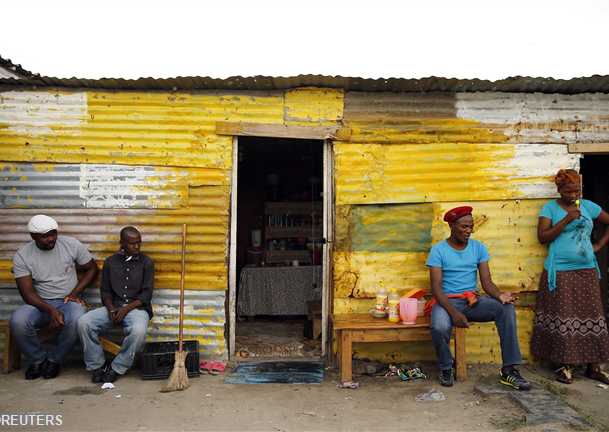
Striking South African miners face terrible hardship

(Vatican Radio) Miners in South Africa are entering the 16th week of a strike, the longest labour dispute since the end of apartheid in 1994.
Workers belonging to the Association of Mineworkers and Construction Union at some of the richest platinum mines in the world, last week rejected the latest wage offer from major mine owners Anglo American Platinum, Impala Platinum and Lonmin .
The mine owners appear confident that after three months with no pay, workers are ready to accept anything. But driven by the aggressive Trade Union, they are still holding out for a more than doubling of basic entry-level pay to the equivalent of just over 1,000 US dollars a month over three to four years.
Much talk is being spent on the enormous pressure that is being put on the industry struggling with high costs and low metals prices and on the effects of the strike on the share market.
Nothing is being said, in the mainstream media, of the terrible hardships being faced by the miners themselves. No pay for many means no food and many of them are starving.
What’s more, an extremely high percentage of miners are affected by the HIV virus and are on Anti-retroviral Therapy. But, as Bishop Kevin Dowling of Rustenburg points out Anti-retroviral drugs do not work on empty stomachs.
Speaking to Vatican Radio’s Linda Bordoni, Bishop Dowling who runs a vast and comprehensive Aids Programme in the Rustenburg area, explains that the ongoing strike “has caused immeasurable suffering: not only the miners not getting paid and are suffering increasing hardship,” but obviously – he points out - in a mining town where everything depends on the mines “the contract workers, the support industries, all of these have been very seriously affected.”
Bishop Dowling, who runs the Tapologo Programme of “Hope, Healing and Compassion” for the hundreds of thousands of people in his diocese infected or affected by the HIV/Aids virus, explains that the strike has also had “terrible results in the health area.”
Listen to the interview…
Bishop Dowling sets the picture by describing the area which is predominantly rural but hosts the biggest platinum mines in the world and consequently an extremely impoverished extended community.
He says that poverty and migration have spawned what “we call shack settlements, squatter camps - informal settlements - is the technical term”, in Rustenburg as well as to the West and to the North of Rustenburg.
A conservative estimate counts some 350,000 people living in the shacks, but Bishop Dowling says he estimates at least double that figure.
The population consists mainly of people migrating from very poor areas of South Africa where there is great unemployment, and of people migrating from countries to the North of South Africa, even as far North as Rwanda. All of them attracted by the possibility of finding work in the shafts of the Platinum mines or in the community that supports them.
Official figures reveal that in the area, the HIV/Aids infection rate between 2002and 2009 has increased from 22 % to 29 %.
Just recently – Dowling says - the government admitted that that percentage has increased, a reality that is confirmed by figures he received from the aids clinics he runs , and that there is an upward trend in the infection rate with an increase from 11% to 16% just among the miners.
Dowling explains there are various factors that contribute to this reality, but basically he says: “miners have the money, whilst hundreds of thousands of poor, desperate, single mothers migrate in search of work to the community. But there is no work, and miners have left their homes, so the sexual relationships bring about this terrible increase in infection”.
Dowling says that over the past three months the major strike has caused incredible suffering to the extended community.
Dowling says the lack of regular meals has defaulted the Anti-Retroviral programmes, because for the drugs to be able to work, people have to eat.
He explains that this is a reality that he has encountered in his aids clinics and anti-retroviral clinics. And even other institutions, like Lonmin itself that runs an aids hospital, has denounced the fact that “at least 1000 of their miners have defaulted” for this reason.
Dowling points out that especially if there is a holistic support system like the one he provides with his Tapologo programme, Anti-retroviral treatment can allow for an excellent quality of life: “but you must have basic food consistently and take your drugs consistently. and if you have a support system in your life you can live well for many years”.
In an extended conversation Bishop Dowling speaks of the effects of the tragic strike two years ago on these same mines, and of how intimidation and violence continues to affect the lives of the miners and of the whole community.
He speaks of the failings of South Africa’s corrupt ruling party and of its incapacity to deliver basic services and of the generation of aids orphans that will pose a major problem to the developing nation in the coming years.
“In spite of everything I think our ordinary people are truly wonderful. If only we are able to create relationships in which people feel their dignity and who they are appreciated. They have enormous ability to know what their problems are and what the solutions can be if they are empowered”.
| All the contents on this site are copyrighted ©. |


